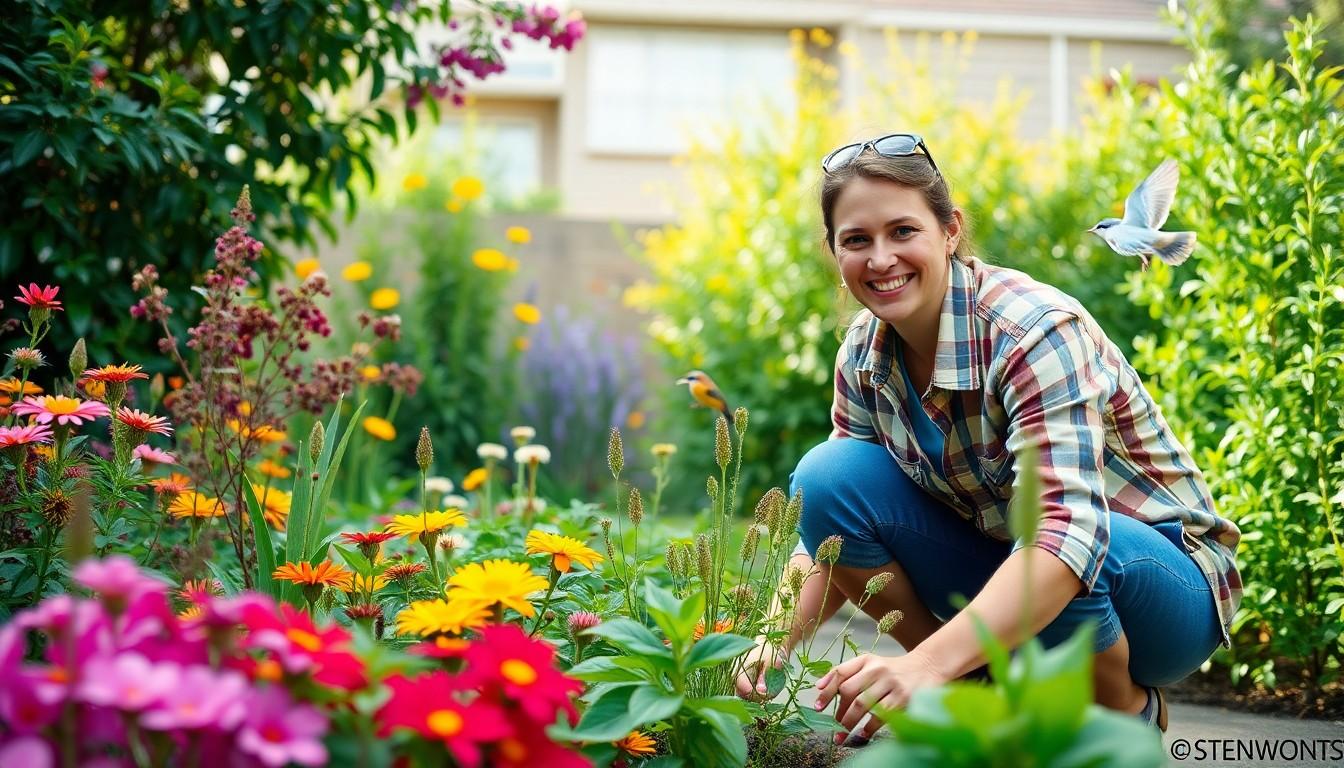Physical Address
304 North Cardinal St.
Dorchester Center, MA 02124
Physical Address
304 North Cardinal St.
Dorchester Center, MA 02124

In a world where even houseplants seem to have a better social life than some people, sustainable gardening has become the trendy way to cultivate not just plants, but also a greener planet. Imagine transforming your backyard into an eco-friendly oasis while impressing your neighbors with your newfound botanical prowess. Who knew saving the Earth could be so chic?
Sustainable gardening focuses on practices that promote ecological balance. It involves using methods that enhance biodiversity and conserve resources. Gardeners can select native plants for their local ecosystems. Choosing these plants supports local wildlife and reduces the need for fertilizers and pesticides.
Soil health plays a crucial role in sustainable gardening. It’s vital to enrich soil with organic matter. Composting kitchen scraps and yard waste helps create nutrient-rich soil. Additionally, rotating crops prevents soil depletion and helps control pests naturally.
Water conservation is another essential aspect. Implementing rainwater collection systems leads to efficient water use. Mulching around plants retains moisture and reduces evaporation. Techniques like drip irrigation can deliver water directly to the roots, minimizing waste.
Encouraging beneficial insects contributes to a sustainable ecosystem. Planting flowers that attract pollinators fosters a balanced environment. Creating habitats such as bee hotels and insect hotels also supports local flora and fauna.
Waste reduction remains important in sustainable gardening. Recycling plant clippings as mulch eliminates unnecessary waste. Using biodegradable pots instead of plastic ones can minimize environmental impact. Furthermore, selecting non-GMO seeds promotes biodiversity and helps avoid the use of harmful chemicals.
Sustainable gardening practices help cultivate a healthier planet. By embracing these methods, gardeners contribute to environmental health while enhancing their landscape. Sustainable choices not only provide aesthetic value but also demonstrate a commitment to eco-friendly living.
“Many homeowners are surprised to learn just how much impact sustainable gardening can have—and leading landscaping companies in Toronto are increasingly integrating native plants, compost systems, and water-saving techniques to meet both aesthetic and ecological goals,” says the owner of Precision Landscaping.

Sustainable gardening brings multiple advantages. Its impact extends beyond personal enjoyment, benefiting the environment and the economy.
Sustainable gardening enhances biodiversity. By choosing native plants, gardeners create habitats for local wildlife, such as birds and beneficial insects. This practice reduces the need for synthetic fertilizers and pesticides, leading to healthier ecosystems. Additionally, techniques like composting improve soil health, promoting microbial activity that supports plant growth. Rainwater collection and drip irrigation conserve water, addressing the growing concern of water scarcity. These practices contribute to cleaner air and soil while decreasing carbon footprints. Overall, sustainable gardening positively impacts the planet, creating a thriving ecosystem.
Gardening sustainably can save money. Native plants typically require less maintenance and fewer resources, which lowers gardening costs. Composting transforms kitchen scraps and yard waste into nutrient-rich soil amendments, reducing reliance on store-bought fertilizers. Sustainable practices often yield higher-quality produce, enhancing food security for families. Investing in organic seeds and non-GMO options promotes biodiversity, which can lead to better crop resilience. Furthermore, eco-friendly landscapes often increase property values, making sustainable gardening not only an environmental choice but a smart economic decision.
Sustainable gardening involves practices that benefit both the environment and gardening efforts. These tips help cultivate thriving ecosystems while promoting responsible resource use.
Soil health plays a crucial role in sustainable gardening. Enriching soil with organic matter, such as compost, enhances nutrient levels. Healthy soil promotes robust plant growth, reducing the need for chemical fertilizers. Crop rotation prevents nutrient depletion and controls pests naturally. Fostering soil diversity through cover crops can also improve soil structure and moisture retention.
Water conservation techniques ensure efficient resource use in gardening. Collecting rainwater in barrels provides a sustainable water source. Utilizing drip irrigation systems delivers water directly to plant roots, minimizing waste. Mulching reduces evaporation and retains moisture in the soil. Implementing xeriscaping with drought-resistant plants can further decrease water usage while maintaining landscape aesthetics.
Choosing the right plants is essential for sustainable gardening. Native plants thrive in local conditions and need less maintenance. They attract beneficial insects and promote biodiversity, creating balanced ecosystems. Selecting non-GMO seeds enhances plant resilience and fosters diversity within gardens. Incorporating perennials reduces the need for annual replanting, saving time and resources.
Incorporating wildlife into sustainable gardening practices enhances ecological balance and promotes biodiversity. Creating a welcoming environment encourages beneficial creatures to thrive.
Native plants attract local wildlife and support ecosystem health. They require less water, leading to reduced irrigation needs. Birds, butterflies, and insects favor plants native to their region, which aids in pollination. Using these species fosters a natural habitat that sustains local fauna. Gardeners can explore their area’s native plant options, ensuring the selection matches climate and soil conditions. Planting a variety of native species creates a robust environment for diverse wildlife.
Creating habitats supports a variety of animal species within the garden. Incorporating features such as birdhouses, bat boxes, and bee hotels encourages wildlife to visit and settle. Adding water sources, like small ponds or birdbaths, offers necessary hydration. Using logs, rocks, and brush piles provides shelter and breeding areas for various creatures. Enhancing garden layers through vertical gardening supports more wildlife by adding different niches. Welcoming natural habitats enriches the garden’s biodiversity, leading to healthier ecosystems.
Embracing sustainable gardening is a rewarding journey that benefits both the environment and the gardener. By implementing eco-friendly practices, individuals can create vibrant green spaces that support local wildlife and enhance biodiversity.
The commitment to soil health, water conservation, and the use of native plants not only fosters a thriving garden but also contributes to a healthier ecosystem. Sustainable gardening reflects a dedication to responsible living while offering economic advantages through reduced maintenance costs and improved produce quality.
As gardeners cultivate their passion, they also play a vital role in promoting a greener planet for future generations.